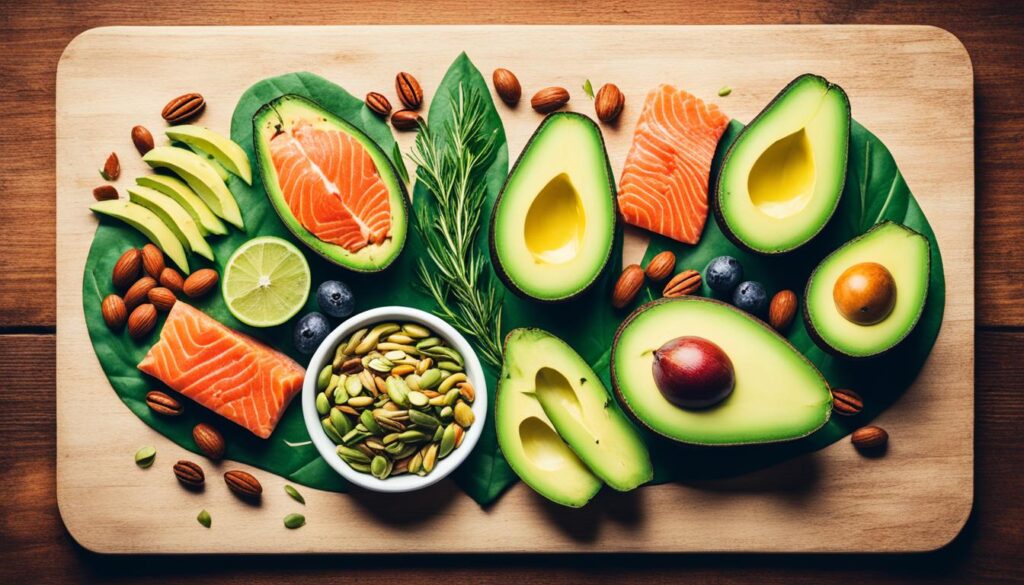For endurance athletes, eating right is key to fueling your body and boosting your performance. Whether you’re into marathons, cycling, or triathlons, knowing what to eat can change the game. This article will give you top Nutritional Tips for Endurance Athletes. These tips will help you perform better and stay healthy.
Table of Contents
ToggleKey Takeaways
- Proper nutrition is crucial for fueling endurance athletes and supporting their training and performance.
- Endurance athletes have unique energy demands that require a tailored nutritional approach.
- Carbohydrates, proteins, and healthy fats play key roles in endurance performance and recovery.
- Timing your nutrient intake and staying hydrated are essential for optimal endurance performance.
- Calculating your individual caloric needs and meal planning can help you fuel your endurance activities effectively.
The Importance of Proper Nutrition for Endurance Athletes
Endurance sports like marathons and triathlons are tough on the body. Endurance nutrition is key for athletes to have enough energy, perform well, and recover. It’s important to know how much energy these sports need and the role of macronutrients for the best sports nutrition and performance.
Understanding the Energy Demands of Endurance Sports
Activities like running and cycling need athletes to keep going for a long time. This means they burn a lot of calories. To stay energized, it’s vital for endurance athletes to eat right and know their calorie requirements. This helps them stay strong, perform well, and stay healthy.
The Role of Macronutrients in Endurance Performance
Carbs, proteins, and fats are crucial for endurance athletes. Carbs give the body quick energy. Proteins help fix and build muscles, and fats support health and energy. Athletes need to get these nutrients in the right amounts for the best sports nutrition.
“Proper nutrition is the foundation of endurance performance. It’s not just about fueling the body, but about providing the right nutrients at the right time to support the athlete’s training and recovery.”
Getting the right mix of macronutrients in an athlete diet helps athletes stay energized, avoid getting tired, and stay healthy. By knowing the importance of endurance nutrition, athletes can plan their diet for better performance on the field.
Carbohydrates: The Primary Fuel Source
Endurance athletes need a steady supply of energy for tough training and competitions. This energy mainly comes from carbohydrates, which are the body’s top choice for fuel. They are key in keeping us going during long workouts and events.
Carbs turn into glucose, the main energy source for our bodies. This glucose goes to the muscles, where it becomes ATP. ATP is the energy that makes our muscles work. So, eating enough carbs helps athletes perform well.
The best carbs for athletes include:
- Whole grains, such as oats, quinoa, and brown rice
- Fruits, like bananas, berries, and citrus fruits
- Starchy vegetables, such as sweet potatoes and potatoes
- Legumes, including lentils, beans, and peas
These complex carbs give steady energy and have extra benefits like fiber, vitamins, and minerals. These support health and performance.
“Carbohydrates are the preferred fuel source for endurance athletes, as they provide the body with the energy it needs to power through long, intense workouts and competitions.”
Adding a mix of high-quality carbs to your diet helps your body get the fuel it needs. This way, you can reach your endurance goals.
Protein: Building and Repairing Muscles
Protein is key for endurance athletes. It helps build and fix the muscles used in hard training and races. Getting the right amount of protein for endurance athletes in your athlete diet is vital for recovery nutrition and doing your best.
Optimal Protein Intake for Endurance Athletes
The right amount of protein varies by age, gender, how much you train, and your calorie needs. Endurance athletes should aim for 1.2 to 2.0 grams of protein per kilogram of body weight. This helps with muscle repair and growth, and supports energy during long activities.
To get enough protein, endurance athletes can eat foods like:
- Lean meats (e.g., chicken, turkey, lean beef)
- Fish and seafood
- Eggs
- Dairy products (e.g., Greek yogurt, low-fat milk)
- Legumes (e.g., lentils, chickpeas)
- Nuts and nut butters
Eating a balanced athlete diet with the right protein for endurance athletes helps with recovery nutrition and performance.
“Adequate protein intake is essential for endurance athletes to maintain and build lean muscle mass, which is crucial for power and efficiency during endurance events.”
Healthy Fats: Essential for Overall Health
Healthy fats are key for endurance athletes, not just for looks. They help support health and boost performance. Adding healthy fats for endurance, like omega-3s and monounsaturated fats, helps fuel the body. This makes the athlete diet better for fuel for endurance.
Omega-3 fatty acids are in fatty fish, chia seeds, and walnuts. They reduce inflammation, improve heart health, and help the brain work better. These are key for staying in shape and recovering well. Monounsaturated fats in avocados, nuts, and olive oil boost energy and help absorb nutrients better.
- Omega-3s reduce inflammation and support heart health
- Monounsaturated fats provide long-lasting energy and improve nutrient absorption
- Healthy fats support overall well-being and endurance performance
Many think healthy fats are bad, but they’re not. They’re vital for a balanced athlete diet. They help athletes fuel for endurance and reach their fitness goals. Adding healthy fats for endurance daily can improve health and performance.

“Healthy fats are not only essential for overall health, but they can also provide a powerful boost to an endurance athlete’s performance.”
Nutritional Tips for Endurance Athletes
For endurance athletes, eating right is key to fueling your body and boosting your performance. It’s important to focus on when to eat nutrients and how to stay hydrated.
Timing Your Nutrient Intake
Eating at the right time can greatly improve your endurance. Make sure to eat carbs, proteins, and healthy fats before, during, and after workouts. This helps keep your energy up, helps muscles recover, and supports your athletic performance.
Hydration Strategies for Optimal Performance
Staying hydrated is vital for athletes in endurance sports. Not drinking enough water can make you perform worse, cause muscle cramps, and lead to health problems. Create a plan to drink water and drinks with electrolytes before, during, and after workouts. Try different ways to see what works best for you and your activities.
“Proper nutrition and hydration are the foundation of any successful endurance training program. By fueling your body strategically, you can unlock your full potential as an athlete.”
It’s important to experiment to find the best way to eat and drink for endurance. Keep an eye on how your body reacts and adjust your eating and drinking as needed. This ensures you’re always ready for your endurance activities.
Pre-Workout Nutrition: Fueling Up for Success
As an endurance athlete, getting your nutrition right before a workout is key. It helps you have the energy and resources you need to do your best. Eating well before a workout can greatly improve your ability to overcome challenges and achieve your goals.
Carbohydrates are a big deal for endurance athletes. They are the main fuel for your muscles during long workouts. Eating the right carbs can keep your energy up and stop you from getting tired. Choose complex carbs like whole grains, fruits, and veggies for a steady energy release.
Don’t forget about protein in your pre-workout plan. A bit of protein helps fix and build muscle, getting your body ready for your workout. Good protein sources include lean meats, eggs, or plant-based options like nut butters or protein powder.
Staying hydrated is also key for endurance athletes. Make sure to drink lots of fluids before your workout. Use water or drinks with electrolytes to keep your body hydrated and ready to go.
When it comes to pre-workout nutrition for endurance, timing matters. Eat your pre-workout meal or snack 1-2 hours before your activity. This lets your body digest and use the nutrients. It ensures you have enough fuel for endurance to get through your workout or competition.
Adding these pre-workout nutrition tips to your athlete diet can help you perform better. Proper fueling is a critical part of any athlete’s training plan.
“Proper pre-workout nutrition is the foundation for endurance success. Fuel your body well, and it will reward you with the energy and stamina to push beyond your limits.”
During-Workout Nutrition: Sustaining Energy Levels
Keeping up your energy during long activities is key to doing well. During-workout nutrition should focus on carbs, electrolytes, and fluids. By planning your snacks right, you make sure your muscles have enough fuel for endurance to keep going.
To keep your energy up, eat carbs every 45 minutes. This “45-minute rule” keeps your muscle glycogen levels up, avoiding the “bonk” or “hitting the wall.” Try to eat 30-60 grams of carbs each hour, based on how hard and long your workout is.
| Workout Duration | Carbohydrate Intake |
|---|---|
| 1-2 hours | 30-60 grams per hour |
| 2-3 hours | 60-90 grams per hour |
| 3+ hours | 90-120 grams per hour |
It’s also key to replace electrolytes lost through sweat, like sodium, potassium, and magnesium. Drinks or gels rich in electrolytes help keep your fluid balance and muscle function right, stopping cramps and tiredness.
“Staying hydrated and fueled during your workout is crucial for athlete diet and endurance performance.”
Using these during-workout nutrition for endurance tips, you can keep your energy up, improve your performance, and get through even the hardest endurance tests.
Post-Workout Nutrition: Recover and Rebuild
For endurance athletes, getting the right nutrition after a workout is key. It helps with muscle recovery, refills energy, and gets the body ready for the next session. Knowing how to time nutrients for recovery is vital for better performance and fewer injuries.
The Importance of Nutrient Timing for Recovery
Right after a tough workout, the body is ready to use nutrients for recovery. Eating carbs, proteins, and healthy fats helps refill glycogen, fix muscle damage, and lower inflammation. This is why post-workout nutrition for endurance athletes is so important.
By eating well after a workout, athletes can recover faster and perform better next time. This smart approach to athlete diet is key for recovery and long-term success.
“Proper post-workout nutrition is essential for endurance athletes to facilitate muscle recovery, replenish energy stores, and prepare the body for the next training session or event.”
Endurance athletes should eat carbs and proteins within 30 minutes to an hour after exercising. This quick intake starts the recovery process and boosts performance for the future.
Putting a focus on post-workout nutrition helps athletes stay fueled and ready for challenges. Adding these tips to their training and eating plans can greatly improve their endurance and competitive edge.
Calculating Caloric Needs for Endurance Athletes
Fueling your body right is key for top performance in endurance sports. You need to think about your weight, how active you are, and how much you train. This helps figure out how many calories you need.
To find out the calorie requirements for endurance athletes, follow these steps:
- First, use the Harris-Benedict equation to find your basal metabolic rate (BMR). This tells you how many calories your body burns at rest.
- Then, multiply your BMR by an activity factor. This depends on how hard and how much you train. For endurance athletes, this factor is usually between 1.6 and 2.1.
- Finally, add 500-1,000 calories to cover the extra energy you burn with your athlete diet and fuel for endurance training.
Let’s say a 150-pound athlete has a BMR of 1,800 calories and trains moderately (1.8 factor). They would need about 3,240 calories a day (1,800 x 1.8 + 500).
| Body Weight (lbs) | BMR (calories) | Activity Factor | Total Daily Calories |
|---|---|---|---|
| 130 | 1,560 | 1.7 | 2,750 |
| 150 | 1,800 | 1.8 | 3,240 |
| 170 | 2,020 | 1.9 | 3,738 |
Remember, these are just rough estimates. Your actual calorie needs can change based on your age, gender, and sport. Talking to a dietitian or sports nutritionist can help you get a more accurate idea of your calorie requirements for endurance athletes. They can also help you create a personalized athlete diet plan.
Meal Planning and Preparation for Busy Athletes
Endurance athletes often have tight training schedules. That’s why meal planning and preparation are key to meeting their nutritional needs. By planning meals well, athletes can fuel their bodies for top performance and recovery. This proactive approach to diet ensures they have the right fuel for endurance activities.
Busy athletes can set aside time on the weekend to plan and prep meals for the week. This means making a weekly menu, shopping for groceries, and cooking healthy meals that can be reheated or assembled easily during the week.
When planning meals for endurance athletes, focus on foods rich in nutrients. These should include whole grains, lean proteins, fruits, vegetables, and healthy fats. These foods support training and recovery.
- Cooking in bulk and portioning meals for the week
- Prepping ingredients in advance (e.g., chopping vegetables, marinating proteins)
- Investing in kitchen appliances that streamline the cooking process (e.g., Instant Pot, air fryer)
- Incorporating easy-to-prepare meals, such as salads, stir-fries, and one-pot dishes
By planning and preparing meals, endurance athletes can make sure they have the right fuel for endurance activities. This supports their health and performance.
| Meal Planning Tips for Endurance Athletes | Benefits |
|---|---|
| Batch cooking and meal prepping | Saves time, ensures consistent nutrition |
| Focusing on nutrient-dense whole foods | Provides the necessary macronutrients and micronutrients |
| Utilizing time-saving kitchen appliances | Streamlines the cooking process |
| Incorporating easy-to-prepare meals | Ensures convenient and nutritious options |
Nutritional Supplements: Do Endurance Athletes Need Them?
Endurance athletes look for ways to boost their performance and speed up recovery. They often wonder about the role of nutritional supplements. A balanced diet is key, but some supplements can offer extra benefits.
For endurance athletes, picking the right supplements is important. They need to know which ones can really help with fuel for endurance and athlete diet. Let’s look at the benefits of different supplements and see which ones might be good for athletes.
Protein Supplements
Endurance athletes need more protein to fix and grow muscles. Supplements like whey, casein, or plant-based options can make sure they get enough protein. This is especially true when eating enough protein through food is hard.
Carbohydrate Supplements
For long events, carbs from sports drinks, gels, or chews keep blood sugar up and energy steady. These are great for fueling during training and races.
Caffeine Supplements
A little caffeine can help endurance athletes by making them more focused and lasting longer. Caffeine in pre-workout formulas can be a smart choice for athletes.
| Supplement | Potential Benefits for Endurance Athletes |
|---|---|
| Protein Supplements | Support muscle repair and growth |
| Carbohydrate Supplements | Maintain blood glucose levels and provide sustained energy |
| Caffeine Supplements | Enhance mental focus and delay fatigue |
Nutritional supplements for endurance athletes can be helpful, but talking to a healthcare expert or sports nutritionist is key. They can create a plan that fits your needs and goals.
Nutritional Tips for Endurance Athletes
For endurance athletes, eating right is key to fueling your body and boosting your performance. Here are some important tips to remember:
- Carbs are your main energy source. Eat plenty of complex carbs like whole grains, fruits, and veggies to keep up with your training and competitions.
- Protein helps repair and build muscle. Aim for lean proteins like chicken, fish, or plant-based options to help with recovery and muscle growth.
- Healthy fats from nuts, avocados, and olive oil provide essential nutrients and boost overall health for endurance athletes.
- Plan your meals well, making sure you’re fueled before, during, and after workouts. This helps keep your energy up and aids in recovery.
- Drink lots of water and electrolyte-rich drinks to replace lost fluids during endurance activities.
| Nutrient | Recommended Daily Intake for Endurance Athletes |
|---|---|
| Carbohydrates | 5-12 grams per kilogram of body weight |
| Protein | 1.2-2.0 grams per kilogram of body weight |
| Healthy Fats | 20-35% of total daily caloric intake |
Follow these nutritional tips to make sure your body is well-fueled and supported for top performance and recovery during endurance training and competitions.

“Proper nutrition is not just about what you eat, but when you eat it. Timing your nutrient intake is key for endurance athletes.”
Adjusting Nutrition for Different Training Phases
As an endurance athlete, your nutritional needs change with each training phase. It’s key to adjust your athlete diet and fuel for endurance for base, peak, and tapering phases. This helps your body meet its unique demands.
Base Training Nutrition
In base training, focus on building endurance. Eat a diet full of carbohydrates for energy during long, easy workouts. Include complex carbs like whole grains, fruits, and veggies to keep your energy up and muscles recovering.
Peak Training Nutrition
When you’re in peak training, your body needs more adjusting nutrition for endurance training. You’ll eat more calories to support intense workouts. Eat complex carbs, lean proteins, and healthy fats to fuel your body well.
Tapering Nutrition
In tapering, you train less but still need the right adjusting nutrition for endurance training for recovery and event prep. Keep a balanced diet but cut down on carbs and up your protein to help muscles repair and get ready.
| Training Phase | Nutritional Focus | Key Macronutrients |
|---|---|---|
| Base Training | Building endurance foundation | Complex carbohydrates |
| Peak Training | Supporting high-intensity workouts | Carbohydrates, lean proteins, healthy fats |
| Tapering | Recovering and preparing for event | Reduced carbohydrates, increased proteins |
Remember, adjusting nutrition for endurance training is a process. Always listen to your body and tweak your athlete diet as needed. Talk to a sports nutritionist or dietitian to get a plan that fits your training and goals.
Conclusion
As we wrap up this guide on nutrition for endurance athletes, it’s clear that eating right is key to doing your best. Understanding how your body uses energy in endurance sports is vital. It helps you make a nutrition plan that fits your goals.
Knowing how to fuel up before, during, and after workouts is crucial. It keeps your energy up, helps your muscles recover, and boosts your overall health. It’s important to know how many calories you need and to eat foods that are full of nutrients.
If you’re an endurance athlete, whether you’re experienced or just beginning, using the tips from this guide can help you do better. Putting nutrition first not only betters your performance. It also keeps you healthy and well for the long run as an endurance athlete.
FAQ
What are the primary macronutrients that endurance athletes need to focus on?
Endurance athletes should focus on carbohydrates, protein, and healthy fats. Carbs fuel their activities. Protein helps build and repair muscles. Healthy fats support overall health and performance.
How much carbohydrate should endurance athletes consume?
Endurance athletes need more carbs than regular people. They should eat 6-10 grams of carbs per kilogram of body weight daily. This depends on their training intensity and schedule.
What are the best sources of protein for endurance athletes?
Great protein sources for endurance athletes include lean meats, poultry, fish, eggs, dairy, legumes, and plant-based powders. Choose lean sources to support muscle recovery without extra calories or fat.
How important is proper hydration for endurance athletes?
Staying hydrated is key for endurance athletes. Dehydration can hurt performance and increase the risk of heat-related illnesses. They should drink water and electrolyte-rich drinks before, during, and after exercise.
What are some effective pre-workout nutrition strategies for endurance athletes?
Good pre-workout snacks for endurance athletes should be high in carbs and moderate in protein, eaten 1-2 hours before exercise. This ensures they have enough fuel for their training or competition.
How important is nutrient timing for endurance athletes?
Nutrient timing is vital for endurance athletes. It helps optimize performance, recovery, and adaptation. They should eat carbs, protein, and other nutrients at specific times before, during, and after exercise.
How can endurance athletes calculate their caloric needs?
Endurance athletes can figure out their caloric needs by considering their body weight, activity level, and training volume. Aim for 30-60 calories per kilogram of body weight daily, adjusting as needed based on their energy use and goals.
Do endurance athletes need to take nutritional supplements?
A balanced diet is key for endurance athletes, but some supplements can help too. Supplements like electrolytes, beta-alanine, and caffeine might boost performance and recovery. But, talk to a sports nutritionist or healthcare professional to see what’s right for you.









